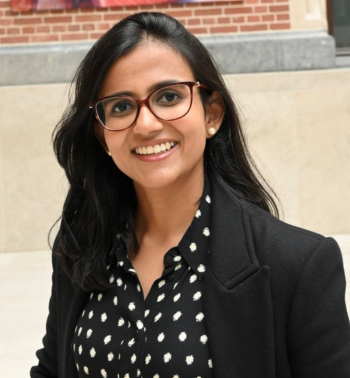21 October 2025
Dr Anangsha Kumar explains how funding from the King’s Health Partners (KHP) Centre for Translational Medicine has allowed her to gain research independence, learn technical skills, and develop her scientific writing.
Please describe your research specialism
I am an obstetrics and gynaecology trainee registrar from Wales. Currently, I am undertaking the KHP Centre for Translational Medicine (CTM) pre-doctoral Clinical Research Excellence Fellowship (p-CREF) under the supervision of Dr Lisa Story and Prof Jana Hutter. My research focuses on advancing fetal imaging to improve antenatal detection of bowel complications such as necrotising enterocolitis (NEC) in high-risk babies.
NEC is a devastating inflammatory bowel disease that affects around 5% of very preterm or low-birthweight babies, causing significant mortality and morbidity. Its causes remain poorly understood, but abnormal fetal gut perfusion and inflammation are thought to contribute.
Using fetal MRI, my research aims to characterise and generate normal ranges of advanced MRI parameters for bowel development in-utero across gestation and identify changes in these parameters in high-risk fetuses. By analysing an existing dataset of MRI scans from high-risk and normal pregnancies, this work seeks to reveal early fetal markers associated with postnatal development of NEC.
How has funding from the KHP CTM helped your research?
The CTM p-CREF has been transformative, giving me protected time to gain research independence and refine the direction of my PhD proposal. During this fellowship, I have been working with experts in fetal imaging and bioengineering to develop MRI-based analysis pipelines to study bowel structure and perfusion.
Through this process, I have gained new technical skills in image analysis, large-scale data management, and scientific writing. Alongside this work, my first-author publication from a separate research project undertaken during this fellowship is under peer review. This reflects how the fellowship has enabled my broader academic growth, required for a competitive doctoral fellowship application.
An equally valuable aspect of this fellowship has been developing strong patient and public involvement (PPI) partnerships. I have collaborated with the Great Ormond Street Hospital Parent and Carer Advisory Group, who have supported this project. Their insights have shaped the way I communicate research aims, refine study design, and ensure that the outcomes remain aligned with patient priorities. Engaging with this group has strengthened my understanding of co-production in research and deepened my appreciation of how patient voices can drive meaningful, translational impact.
Working closely with my supervisors, I have refined the project from its original focus on preterm and growth-restricted pregnancies to also include pregnancies with gastroschisis babies. This broadens the scope for future doctoral applications and enables exploration of NEC risk across a wider spectrum of high-risk pregnancies.
How does your research have the potential to benefit patients?
My goal is to generate advanced MRI parameters that can antenatally identify fetuses most likely to develop NEC later in life, enabling early intervention and personalised neonatal care. If MRI biomarkers can reliably indicate risk before birth, this could transform perinatal management allowing targeted monitoring, early feeding decisions and better resource planning in neonatal units ultimately reducing morbidity and mortality from NEC and improving outcomes for some of the most vulnerable babies.
How does working within KHP benefit your research?
Working within KHP provides unparalleled access to expertise across clinical, imaging, and data-science disciplines. The collaborative environment at King’s College London fosters synergy between clinicians, physicists, engineers and public-engagement specialists, which has been vital for refining both the technical and translational aspects of my work.
The Department of Early Life Imaging, supported by the Biomedical Engineering and Imaging Sciences (BMEIS) team, offers world-leading infrastructure and mentorship that have shaped my research direction. Being part of this multidisciplinary network, motivates me to transform innovation into impact for mothers and babies.
Applications are open for next round of CTM pre-doctoral Clinical Research Excellence Fellowships. The scheme offers the equivalent of one year of 100% FTE salary funding to allow protected research time and training for health professionals working in translational medicine.
Deadline for applications: Tuesday 25 November. More information and apply here.





